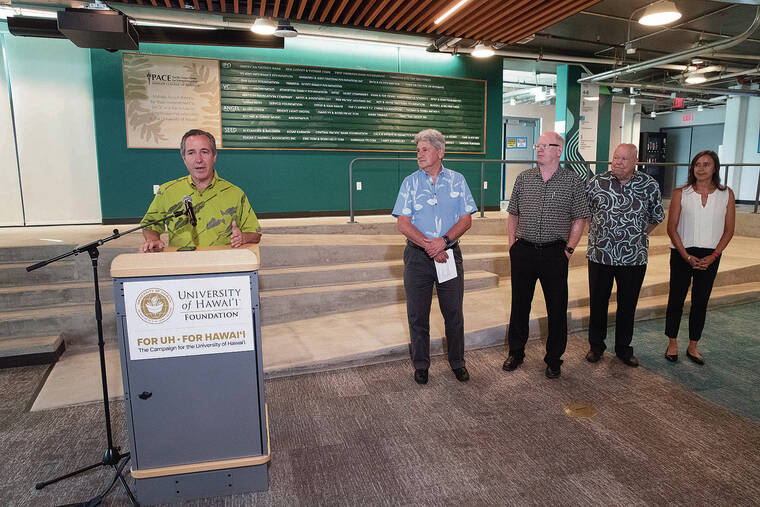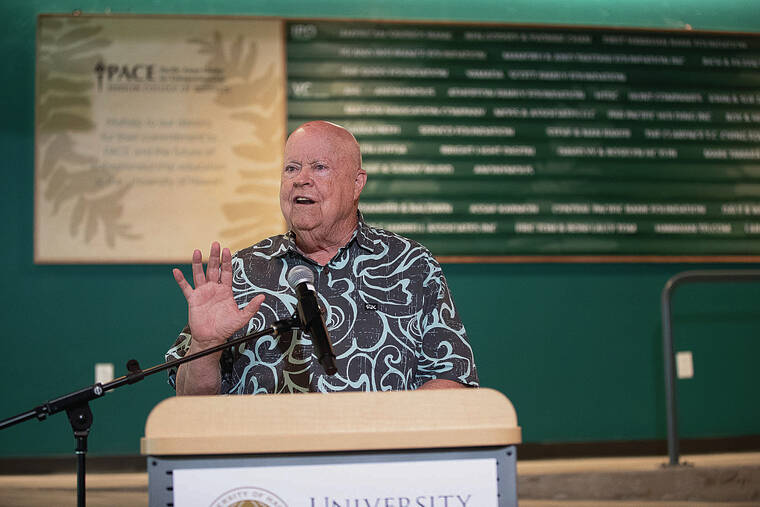The University of Hawaii Foundation on Wednesday launched the public phase of an ambitious $1 billion fundraising campaign aimed at support for students, UH research, Native Hawaiian stewardship, sustainability, Hawaii’s workforce, community engagement and innovation and entrepreneurship.
“These are the kind of things that only UH can address for our community,” said UH President David Lassner at a news conference. “You can’t go anywhere in Hawaii without encountering our alumni as leaders and as the people who are moving this entire state forward. I just couldn’t be prouder of Hawaii and I’m very grateful for the support we get from our community.”
Since the kickoff of For UH • For Hawai‘i in July 2018, the campaign has raised about $570 million, Tim Dolan, UH vice president of advancement and UH Foundation CEO, said Wednesday. Among donors so far are Priscilla Chan and her husband, Meta CEO Mark Zuckerberg, who contributed $50 million to ocean health, UH’s largest cash gift to date.
The public phase was launched at the new UH Manoa Residences for Innovative Student Entrepreneurs building, which opened to more than 325 student residents in August.
The RISE building, which was fully funded by the UH Foundation and Hunt Development Group Hawaii, is a testament to successful impacts that tax-dollar alternatives can have on the community, said For UH • For Hawai‘i campaign chairman Walter A. Dods Jr., who contributed $5 million toward the new building.
Dods, an alumnus of UH Manoa’s Shidler College of Business, chaired the 1998 UH Campaign for Hawaii that raised $116 million for the university.
“We believe this historic campaign will elevate UH to its greater potential as a world-class university and provide a solid foundation for Hawaii’s future,” said Dods. “There is no better investment than investing in Hawaii’s future leaders.”
Private support for UH is critical for maintaining academic and research excellence as public funding fluctuates with Hawaii’s economy, the foundation said in a news release.
“You can only raise so much from tax dollars because of all the demands,” Dods said. “This was done with private funds, financing, the revenue from the dormitory pays off the bonds and the university holds this free and clear. … That’s what the university needs.”
The funds raised so far pale in comparison to the impacts it will have on the school’s students, its research and the larger community, Dolan said.
After observing the vibrant and expanding economies outside of Hawaii, the common denominator one finds is a commitment to supporting the region’s universities, said UH Foundation board of trustees Chair Rich Wacker.
The campaign will help UH make stronger contributions to advancements in fields like health care and technology, Lassner added. It will also enable it to better address the various challenges the state is facing, including worker shortages, climate change, the Red Hill fuel spill, health disparities and fallout from the Maui wildfires, Lassner said.
One of the foundation’s goals is for UH to become, “a model for what it means to be an Indigenous-serving and Indigenous-centered institution, where Native Hawaiians thrive, traditional Hawaiian values and knowledge are embraced, and UH scholarship and service advance all Native Hawaiians and Hawaii.”
While UH has continued to make headway throughout the pandemic and beyond, funds generated through campaigns like For UH • For Hawai‘i help the school and its students to reach new levels of success, he said.
“It helps us achieve that next level of just outstanding performance,” Lassner said. “We serve our students well, but the scholarship money that comes from our private donors helps students who otherwise might not be able to afford a college education that is transformative for them.”
———
Linsey Dower covers ethnic and cultural affairs and is a corps member of Report for America, a national service organization that places journalists in local newsrooms to report on undercovered issues and communities.






